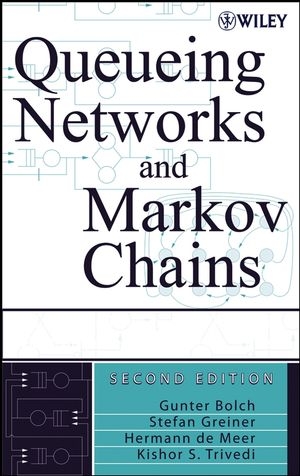
Queueing Networks and Markov Chains
Wiley-Interscience (Verlag)
978-0-471-56525-3 (ISBN)
- Titel z.Zt. nicht lieferbar
- Versandkostenfrei innerhalb Deutschlands
- Auch auf Rechnung
- Verfügbarkeit in der Filiale vor Ort prüfen
- Artikel merken
Critically acclaimed text for computer performance analysis--now in its second edition
The Second Edition of this now-classic text provides a current and thorough treatment of queueing systems, queueing networks, continuous and discrete-time Markov chains, and simulation. Thoroughly updated with new content, as well as new problems and worked examples, the text offers readers both the theory and practical guidance needed to conduct performance and reliability evaluations of computer, communication, and manufacturing systems.
Starting with basic probability theory, the text sets the foundation for the more complicated topics of queueing networks and Markov chains, using applications and examples to illustrate key points. Designed to engage the reader and build practical performance analysis skills, the text features a wealth of problems that mirror actual industry challenges.
New features of the Second Edition include:
* Chapter examining simulation methods and applications
* Performance analysis applications for wireless, Internet, J2EE, and Kanban systems
* Latest material on non-Markovian and fluid stochastic Petri nets, as well as solution techniques for Markov regenerative processes
* Updated discussions of new and popular performance analysis tools, including ns-2 and OPNET
* New and current real-world examples, including DiffServ routers in the Internet and cellular mobile networks
With the rapidly growing complexity of computer and communication systems, the need for this text, which expertly mixes theory and practice, is tremendous. Graduate and advanced undergraduate students in computer science will find the extensive use of examples and problems to be vital in mastering both the basics and the fine points of the field, while industry professionals will find the text essential for developing systems that comply with industry standards and regulations.
GUNTER BOLCH, PhD, is Academic Director in the Department of Computer Science, University of Erlangen. He is a coauthor of MOSEL, a powerful specification language based on Markov chains.He has published five textbooks and more than 130 articles on performance modeling of computer and communication systems and applications. STEFAN GREINER, PhD, is Researcher at the DaimlerChrysler AG. He is coauthor of MOSEL and the recipient of the best paper award at the ESS94conference. HERMANN de MEER, PhD, is Professor in the Faculty of Mathematicsand Computer Science, University of Passau. He holds a chair in the Computer Networking and Communications Department; has published more than eighty peer-reviewed articles on performance modeling, computer networking, self-organization, quality of service, and peer-to-peer systems; and holds several international patents on related topics. KISHOR S. TRIVEDI, PhD, is Chaired Professor in the Department of Electrical and Computer Engineering and the Department of Computer Science, Duke University. A Fellow of IEEE, he is the author of the bestselling textbook Probability and Statistics with Reliability, Queueing, and Computer Science Applications, Second Edition, published by Wiley.
Preface to the Second Edition. Preface to the First Edition.
1. Introduction.
1.1 Motivation.
1.2 Methodological Background.
1.3 Basics of Probability and Statistics.
2. Markov Chains.
2.1 Markov Processes.
2.2 Performance Measures.
2.3 Generation Methods.
3. Steady-State Solutions of Markov Chains.
3.1 Solution for a Birth Death Process.
3.2 Matrix-Geometric Method: Quasi-Birth-Death Process.
3.3 Hessenberg Matrix: Non-Markovian Queues.
3.4 Numerical Solution: Direct Methods.
3.5 Numerical Solution: Iterative Methods.
3.6 Comparison of Numerical Solution Methods.
4. Steady-State Aggregation/Disaggregation Methods.
4.1 Courtois' Approximate Method.
4.2 Takahashi's Iterative Method.
5. Transient Solution of Markov Chains.
5.1 Transient Analysis Using Exact Methods.
5.2 Aggregation of Stiff Markov Chains.
6. Single Station Queueing Systems.
6.1 Notation.
6.2 Markovian Queues.
6.3 Non-Markovian Queues.
6.4 Priority Queues.
6.5 Asymmetric Queues.
6.6 Queues with Batch Service and Batch Arrivals.
6.7 Retrial Queues.
6.8 Special Classes of Point Arrival Processes.
7. Queueing Networks.
7.1 Definitions and Notation.
7.2 Performance Measures.
7.3 Product-Form Queueing Networks.
8. Algorithms for Product-Form Networks.
8.1 The Convolution Algorithm.
8.2 The Mean Value Analysis.
8.3 Flow Equivalent Server Method.
8.4 Summary.
9. Approximation Algorithms for Product-Form Networks.
9.1 Approximations Based on the MVA.
9.2 Summation Method.
9.3 Bottapprox Method.
9.4 Bounds Analysis.
9.5 Summary.
10. Algorithms for Non-Product-Form Networks.
10.1 Nonexponential Distributions.
10.2 Different Service Times at FCFS Nodes.
10.3 Priority Networks.
10.4 Simultaneous Resource Possession.
10.5 Prograrns with Internal Concurrency.
10.6 Parallel Processing.
10.7 Networks with Asymmetric Nodes.
10.8 Networks with Blocking.
10.9 Networks with Batch Service.
11. Discrete-Event Simulation.
11.1 Introduction to Simulation.
11.2 Simulative or Analytic Solution?
11.3 Classification of Simulation Models.
11.4 Classification of Tools in DES.
11.5 The Role of Probability and Statistics in Simulation.
11.6 Applications.
12. Performance Analysis Tools.
12.1 PEPSY.
12.2 SPNP.
12. 3 MOSEL-2.
12.4 SHARPE.
12.5 Characteristics of Some Tools.
13. Applications.
13.1 Case Studies of Queueing Networks.
13.2 Case Studies of Markov Chains.
13.3 Case Studies of Hierarchical Models.
Glossary.
Bibliography.
Index.
| Erscheint lt. Verlag | 23.5.2006 |
|---|---|
| Sprache | englisch |
| Maße | 158 x 241 mm |
| Gewicht | 1406 g |
| Themenwelt | Technik ► Elektrotechnik / Energietechnik |
| ISBN-10 | 0-471-56525-3 / 0471565253 |
| ISBN-13 | 978-0-471-56525-3 / 9780471565253 |
| Zustand | Neuware |
| Haben Sie eine Frage zum Produkt? |
aus dem Bereich


